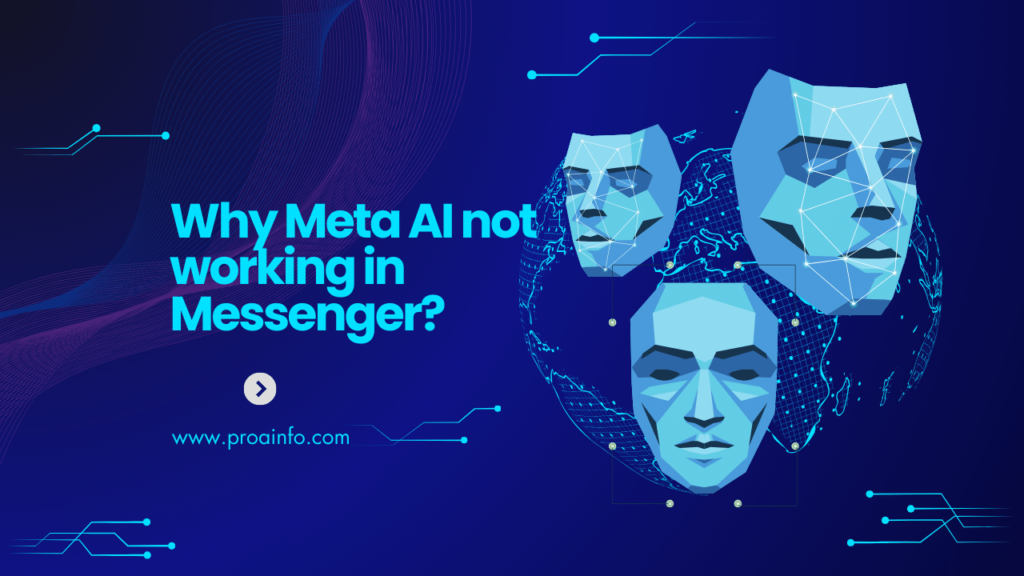Why Meta AI not working in Messenger? In recent years, Meta (formerly Facebook) has made significant strides in incorporating artificial intelligence (AI) into its products and services. One area where the company has focused its efforts is the integration of AI into its messaging platform, Messenger.
However, despite Meta’s investments and ambitions, the implementation of AI in Messenger has not lived up to expectations. This article will explore the reasons why Meta’s AI is not working effectively in Messenger and the challenges the company faces in this endeavor.
The Promise of AI in Messaging
Meta’s vision for AI in Messenger is to create a more seamless and intelligent conversational experience for users. The company envisions AI-powered virtual assistants that can understand natural language, provide relevant information, and even engage in more complex tasks like scheduling appointments or making reservations.
The potential benefits of AI in messaging are numerous. AI-powered assistants could help users find information more quickly, automate routine tasks, and provide personalized recommendations based on their interests and preferences. Additionally, AI could help businesses and organizations streamline customer service operations, reducing response times and improving overall customer satisfaction.
Meta’s Efforts in Integrating AI into Messenger

Meta has invested significant resources into developing AI capabilities for Messenger. The company has acquired several AI startups, including Ozlo, a conversational AI platform, and Wit.ai, a natural language processing (NLP) company. Meta has also established dedicated AI research teams and collaborations with academic institutions to advance the state of the art in areas like natural language understanding and generation.
One of Meta’s most notable efforts in integrating AI into Messenger is the development of its conversational AI assistant, called “M.” Launched in 2015, M was designed to handle complex queries and tasks, leveraging both AI and human assistance. However, after initially rolling out M to a limited number of users, Meta ultimately scaled back the project and discontinued its wider deployment.
Challenges and Shortcomings
Despite Meta’s ambitions and investments, the integration of AI into Messenger has faced several significant challenges and shortcomings. Here are some of the key reasons why Meta’s AI is not working effectively in Messenger:
- Natural Language Understanding Limitations One of the biggest hurdles in implementing AI in messaging is the complexity of natural language understanding (NLU). Accurately interpreting the nuances and context of human language is a formidable challenge for AI systems, particularly in the realm of conversational interfaces.
While Meta has made advancements in NLU through its research efforts, the complexity of human language often leads to misunderstandings or incomplete comprehension by AI assistants. This can result in frustrating experiences for users, who may find themselves having to rephrase or simplify their queries to get the desired response.
- Task Complexity and Domain Specificity Another challenge lies in the complexity and specificity of the tasks that users expect AI assistants to handle within a messaging context. While AI may excel at certain narrowly defined tasks, such as answering factual questions or providing basic recommendations, more complex tasks involving multiple steps, domain-specific knowledge, or subjective decision-making can be difficult for current AI systems to handle effectively.
For example, an AI assistant may struggle with tasks like making travel arrangements that involve coordinating flights, hotels, and activities based on personal preferences and constraints. These types of complex, open-ended tasks often require a level of reasoning and adaptability that current AI systems have yet to achieve.
- Context and Conversational State Management Effective conversational AI requires the ability to maintain and understand context across multiple turns of a conversation. This involves keeping track of the conversational state, remembering previous exchanges, and seamlessly incorporating new information into the dialogue.
However, managing conversational context and state can be a significant challenge, particularly in messaging environments where conversations may span extended periods and can be interrupted or resumed at any time. Meta’s AI systems may struggle to maintain coherence and relevance in such scenarios, leading to disjointed or nonsensical responses.
- Privacy and Security Concerns As a company that handles vast amounts of user data, Meta must navigate stringent privacy and security regulations when it comes to implementing AI in messaging. Users may be hesitant to share personal information or engage with AI assistants if they have concerns about data privacy or the potential for misuse or unauthorized access.
Meta must ensure that its AI systems adhere to strict data protection protocols and provide transparency about how user data is collected, stored, and utilized. Failure to address these concerns could hinder user adoption and trust in AI-powered messaging experiences.
- User Expectations and Anthropomorphization When interacting with AI assistants, users often have unrealistic expectations or assign human-like qualities to the AI system. This phenomenon, known as anthropomorphization, can lead to frustration and disappointment when the AI’s capabilities fall short of these expectations.
Users may expect AI assistants to understand and respond to complex emotional cues, engage in nuanced conversations, or exhibit human-like reasoning and decision-making abilities. However, current AI systems are still limited in their ability to replicate these human traits, leading to a disconnect between user expectations and the actual performance of the AI.
- Lack of Widespread Adoption and Network Effects The success of messaging platforms like Messenger relies heavily on network effects – the more people use the platform, the more valuable it becomes for everyone. However, the adoption of AI-powered features in Messenger has been relatively slow, which can hinder the development of these capabilities.
Without a critical mass of users actively engaging with AI assistants, Meta may struggle to gather the data and feedback needed to improve and refine its AI systems. This lack of widespread adoption can create a self-reinforcing cycle, where users are reluctant to embrace AI features due to their perceived limitations, further hampering the development of these capabilities.
Potential Solutions and Future Outlook

Despite the challenges, Meta is unlikely to abandon its efforts to integrate AI into Messenger. The potential benefits of AI-powered messaging experiences are too significant to ignore, and the company has made substantial investments in this area. Here are some potential solutions and considerations for Meta’s future AI efforts in Messenger:
- Focused AI Development and Narrow Domain Expertise Rather than attempting to develop a general-purpose AI assistant capable of handling a wide range of tasks, Meta may find more success by focusing its efforts on developing AI systems with narrow domain expertise. For example, the company could develop specialized AI assistants for specific tasks like scheduling appointments, making travel arrangements, or providing customer support for Meta’s products and services.
By narrowing the scope and domain of the AI’s capabilities, Meta can leverage its data and resources more effectively, potentially delivering better performance and user experiences within these focused areas.
- Hybrid AI-Human Approach Meta could explore a hybrid approach that combines AI and human assistance to address the limitations of current AI systems. This approach could involve AI assistants handling routine or well-defined tasks, while escalating more complex or subjective queries to human agents or subject matter experts.
By leveraging the strengths of both AI and human intelligence, Meta may be able to provide a more seamless and satisfying experience for users, while addressing the shortcomings of relying solely on AI.
- Improved Conversational Context Management Investing in advanced techniques for managing conversational context and state could help Meta’s AI systems maintain coherence and relevance across extended dialogues. This may involve developing more sophisticated language models, incorporating memory and attention mechanisms, and leveraging contextual cues from user data and behavior patterns.
By improving context management, Meta’s AI assistants could provide more natural and adaptive responses, enhancing the overall conversational experience for users.
- Privacy and Transparency Initiatives To address user concerns about privacy and security, Meta should prioritize transparency and provide clear explanations about how user data is collected, processed, and utilized by its AI systems. The company could also explore privacy-preserving techniques, such as federated learning or differential privacy, to minimize the exposure of sensitive user data while still enabling AI model training.
By proactively addressing privacy and security concerns, Meta could foster greater trust and adoption of its AI-powered messaging features.
- Integration with Other Meta Products and Services One potential advantage for Meta is the ability to leverage data and insights from its other products and services, such as Instagram, WhatsApp, and Oculus, to enhance the capabilities of its AI systems in Messenger. By integrating data and functionality across its various platforms, Meta could create more seamless and interconnected experiences for users.
For example, an AI assistant in Messenger could leverage a user’s social media data to provide personalized recommendations or enable cross-platform features like sharing content or coordinating events.
- Continued Research and Industry Collaboration Meta should maintain its commitment to advancing AI research, both through internal efforts and collaborations with academic institutions and industry partners. By staying at the forefront of AI developments and contributing to the broader AI research community, Meta can continually enhance the capabilities of its AI systems and stay ahead of emerging trends and breakthroughs.
Additionally, Meta could explore partnerships or acquisitions of promising AI startups or technologies to augment its in-house capabilities and accelerate the integration of AI into Messenger.
Conclusion
While Meta’s efforts to integrate AI into Messenger have faced significant challenges, the potential benefits of AI-powered messaging experiences make it an endeavor worth pursuing. As one of the leading tech companies in the world, Meta has the resources and expertise to overcome the current limitations and drive innovation in this space.
However, achieving success with AI in Messenger will require a multifaceted approach, addressing issues related to natural language understanding, task complexity, context management, privacy concerns, and user expectations. Meta may need to recalibrate its ambitions, focusing on narrow domains or hybrid AI-human solutions, while continually investing in advanced research and development.
Ultimately, the integration of AI into messaging platforms like Messenger is not just a technological challenge but also a user experience challenge. Meta must strike a balance between pushing the boundaries of what AI can achieve while ensuring that users have a seamless, intuitive, and trustworthy experience when engaging with these AI-powered features.
As AI technologies continue to evolve and Meta refines its approach, the messaging landscape could be transformed, ushering in a new era of intelligent, personalized, and efficient communication. While the road ahead may be paved with challenges, the rewards of successfully integrating AI into Messenger could be profound, shaping the future of how we interact, communicate, and collaborate in the digital realm.








1 thought on “Why Meta AI not working in Messenger?”